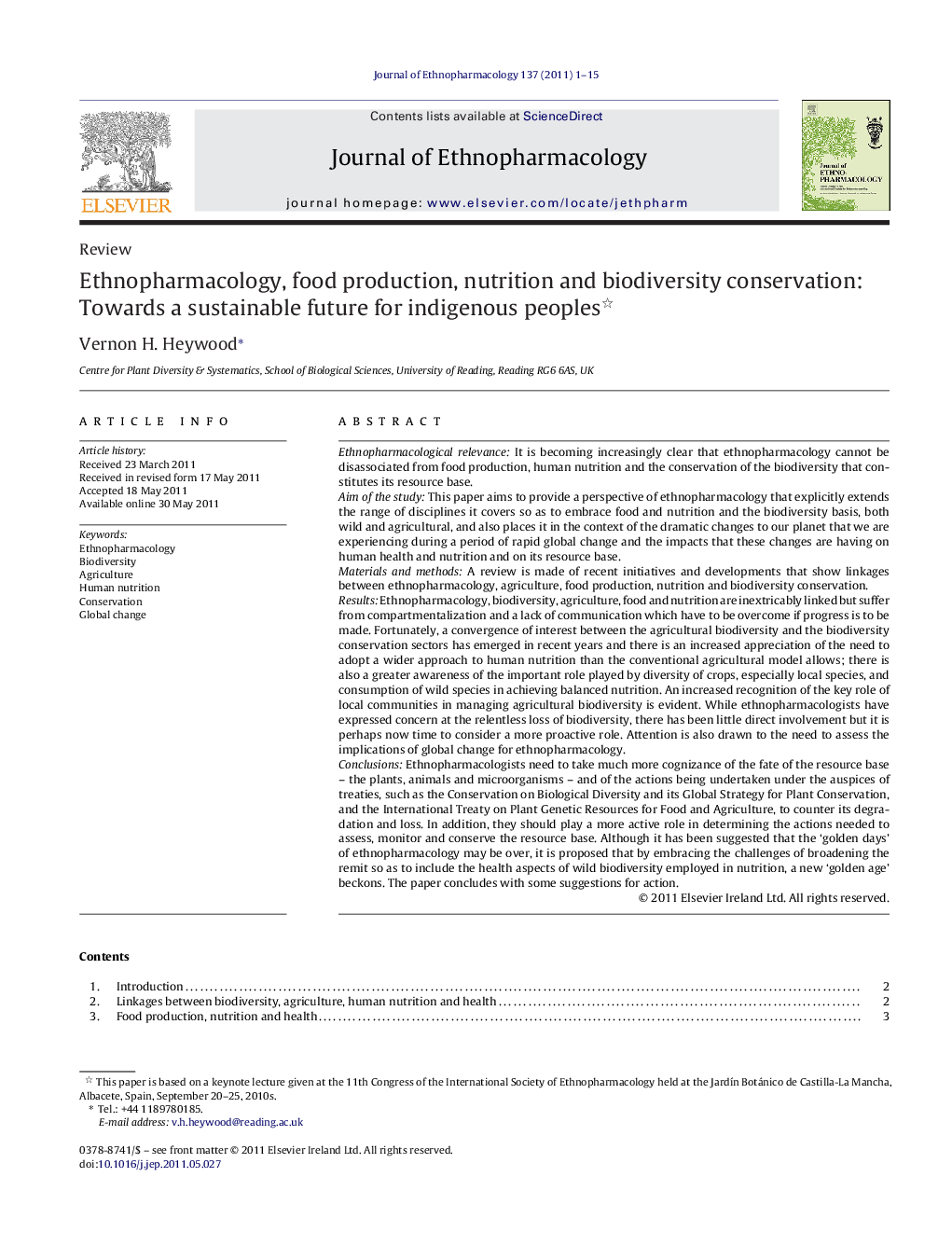| کد مقاله | کد نشریه | سال انتشار | مقاله انگلیسی | نسخه تمام متن |
|---|---|---|---|---|
| 5838617 | 1123981 | 2011 | 15 صفحه PDF | دانلود رایگان |
عنوان انگلیسی مقاله ISI
Ethnopharmacology, food production, nutrition and biodiversity conservation: Towards a sustainable future for indigenous peoples
دانلود مقاله + سفارش ترجمه
دانلود مقاله ISI انگلیسی
رایگان برای ایرانیان
کلمات کلیدی
موضوعات مرتبط
علوم پزشکی و سلامت
داروسازی، سم شناسی و علوم دارویی
داروشناسی
پیش نمایش صفحه اول مقاله

چکیده انگلیسی
Ethnopharmacological relevanceIt is becoming increasingly clear that ethnopharmacology cannot be disassociated from food production, human nutrition and the conservation of the biodiversity that constitutes its resource base.Aim of the studyThis paper aims to provide a perspective of ethnopharmacology that explicitly extends the range of disciplines it covers so as to embrace food and nutrition and the biodiversity basis, both wild and agricultural, and also places it in the context of the dramatic changes to our planet that we are experiencing during a period of rapid global change and the impacts that these changes are having on human health and nutrition and on its resource base.Materials and methodsA review is made of recent initiatives and developments that show linkages between ethnopharmacology, agriculture, food production, nutrition and biodiversity conservation.ResultsEthnopharmacology, biodiversity, agriculture, food and nutrition are inextricably linked but suffer from compartmentalization and a lack of communication which have to be overcome if progress is to be made. Fortunately, a convergence of interest between the agricultural biodiversity and the biodiversity conservation sectors has emerged in recent years and there is an increased appreciation of the need to adopt a wider approach to human nutrition than the conventional agricultural model allows; there is also a greater awareness of the important role played by diversity of crops, especially local species, and consumption of wild species in achieving balanced nutrition. An increased recognition of the key role of local communities in managing agricultural biodiversity is evident. While ethnopharmacologists have expressed concern at the relentless loss of biodiversity, there has been little direct involvement but it is perhaps now time to consider a more proactive role. Attention is also drawn to the need to assess the implications of global change for ethnopharmacology.ConclusionsEthnopharmacologists need to take much more cognizance of the fate of the resource base - the plants, animals and microorganisms - and of the actions being undertaken under the auspices of treaties, such as the Conservation on Biological Diversity and its Global Strategy for Plant Conservation, and the International Treaty on Plant Genetic Resources for Food and Agriculture, to counter its degradation and loss. In addition, they should play a more active role in determining the actions needed to assess, monitor and conserve the resource base. Although it has been suggested that the 'golden days' of ethnopharmacology may be over, it is proposed that by embracing the challenges of broadening the remit so as to include the health aspects of wild biodiversity employed in nutrition, a new 'golden age' beckons. The paper concludes with some suggestions for action.
ناشر
Database: Elsevier - ScienceDirect (ساینس دایرکت)
Journal: Journal of Ethnopharmacology - Volume 137, Issue 1, 1 September 2011, Pages 1-15
Journal: Journal of Ethnopharmacology - Volume 137, Issue 1, 1 September 2011, Pages 1-15
نویسندگان
Vernon H. Heywood,